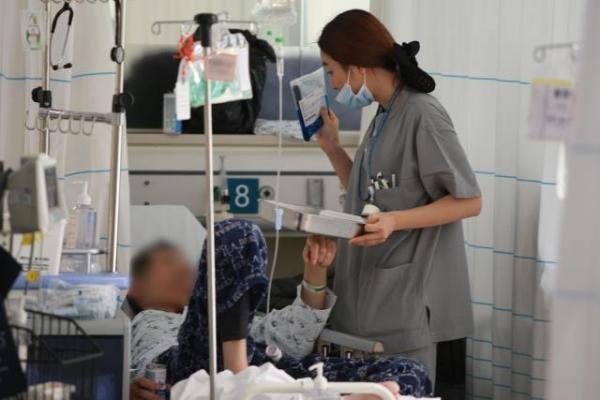After receiving a lung cancer diagnosis and being told surgery is necessary, many patients visiting large hospitals, including the “Big Five,” are advised to undergo expensive chemotherapy before surgery.
Some lung cancer patients and their families worry this means the cancer is too advanced for surgery, but that's not the case. The premise of “neoadjuvant chemotherapy”—chemotherapy before surgery—is that surgery is still an option.
So, why is expensive chemotherapy administered before lung cancer surgery?

Professor Yoon Shin-kyo of the Department of Medical Oncology at Asan Medical Center explained this on the hospital's YouTube channel: “The intention is to reduce the tumor size and induce an immune response through chemotherapy before surgery, thereby lowering the risk of lung cancer recurrence after surgery.”
However, not all lung cancer patients are eligible for this neoadjuvant chemotherapy.
Patients with small cell lung cancer (SCLC) are not candidates for neoadjuvant therapy; only those with non-small cell lung cancer (NSCLC) qualify. Additionally, patients with stage 1 NSCLC are also ineligible. “The target patients are those with stage 2 or 3 NSCLC, meaning those with stage 2 or 3 disease, not stage 1, where lymph node metastasis is confirmed before surgery,” Professor Yoon said.
Additionally, patients with stage 2 or 3 NSCLC who have targetable genes, such as EGFR or ALK, as identified by genetic testing, are also not candidates for neoadjuvant chemotherapy.
"Neoadjuvant chemotherapy for lung cancer is intended for patients without targetable genes. If targetable genes are present, surgery can proceed immediately," Professor Yoon said. He explained that treatment protocols have changed because better outcomes have been reported when neoadjuvant chemotherapy is administered to stage 2 or 3 NSCLC patients without targetable genes.
How effective is neoadjuvant chemotherapy—the combination of immunotherapy and cytotoxic chemotherapy—for lung cancer, then?
Treatment efficacy varies slightly, depending on the expression of the immune marker “PD-L1,” which serves as an indicator to predict the effect of neoadjuvant chemotherapy before surgery. High PD-L1 expression correlates with higher treatment efficacy, while low PD-L1 expression results in lower efficacy; however, it remains significantly more effective than conventional treatment.
Professor Yoon explained the efficacy of neoadjuvant chemotherapy for lung cancer.
“If the PD-L1 immune marker is low, the best-case scenario response—complete remission, where no visible cancer cells are found under the microscope after surgery—occurs in 15 percent of cases. If PD-L1 is very high, complete remission can be achieved in up to 35 percent of cases,” he said.
Of course, not all patients can undergo lung cancer surgery after neoadjuvant chemotherapy.
Professor Yun Jae-kwang of the Department of Cardiovascular and Thoracic Surgery at Asan Medical Center explained why, saying, “Many studies consistently show that in about 20 percent of cases, surgery ultimately cannot be performed and the disease progresses more than anticipated. In such cases, radiation therapy followed by chemotherapy may be more beneficial for the patient than surgery.”
So, how is neoadjuvant chemotherapy administered? This treatment begins a few days to a week after the hospital determines the treatment plan.
Professor Yoon Shin-kyo said, “Neoadjuvant chemotherapy involves receiving injections. A combination of immunotherapy and cytotoxic chemotherapy is administered in the hospital outpatient department over about three to five hours, with most treatments spaced three weeks apart. (Depending on the drugs), patients typically receive three to four injections.”
Lung cancer surgery is performed four to six weeks after the final preoperative chemotherapy injection. Professor Yoon Shin-kyo explained the reason for this four-to-six-week interval between chemotherapy and surgery: “This allows the effects of chemotherapy to fully subside, the immune system to recover, and physical strength to be restored, creating the necessary condition for undergoing surgery under general anesthesia.”
While neoadjuvant chemotherapy for lung cancer is more effective than conventional treatment, it's also true that there are barriers to receiving it. This is because the treatment is currently not covered by national health insurance, making it expensive.
Professor Yoon Shin-kyo said, “The cost of neoadjuvant chemotherapy is the most practical concern,” adding, “Since the government still doesn't cover it, patients must bear 100 percent of the cost themselves.”
If patients cannot receive neoadjuvant chemotherapy due to cost concerns, does that mean they have no opportunity to access a treatment superior to conventional options, then? No.
Professor Yoon Shin-kyo said, “If the treatment cost is a significant burden, there is the opportunity to participate in clinical trials. Participating in a clinical trial can alleviate much of the financial burden, so consulting with the medical oncology department would be advisable.”

